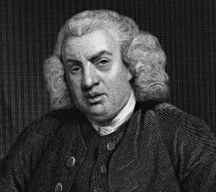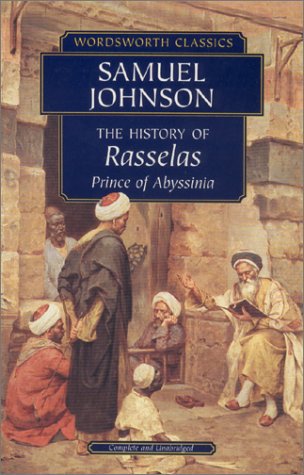¡@
Samuel Johnson
|
Source: Encarta Online |
Biographical Sketches of memorable Christians of the Past, Samuel Johnson |
¡@
The History of Rasselas, Prince of Abyssinia (1759)
-
Rasselas is a philosophical fable in the form of an Oriental tale. The action and characters serve to illustrate the theme that humans should not waste their lives in wishful thinking.
|
Source: Amazon |
Rasselas
is searching for happiness.
He and Imlac, an Eastern wise man, dig their way out of the Happy
Valley, where the Emperor's children are confined. Nekayah, his sister, and
Pekuah, her companion, accompany the two men. Their search takes them from Suez
to Cairo, visiting all types of men, and finding that no one is really happy.
At the Pyramids, Pekuah is kidnapped by Arabs. After her release, all decide on
what would bring them true happiness. Pekuah chooses a convent, Nekayah chooses
knowledge, the Prince would like a little kingdom where he could administer
justice. Knowing that they will never obtain these things, they finally journey
back home.
2.
The name "Happy Valley" calls to mind the garden of Eden.
Critics have interpreted Rasselas
as a fable of everyman's passage from innocence to experience. Point out
details in the text that support such an interpretation.
3.
To equate
the Happy Valley with the biblical Eden is to ignore certain sinister details
in its description. Find phrases that suggest the valley stands for the
inclination of humanity toward self-deception
and immersion in the pleasures of life as a means of avoiding its pains.
4.
In his search for happiness, Rasselas encounters many different types of
people all of whom have symbolic significance. By what does Johnson satirize
the hermit in Ch. XXI? by what the philosopher in Ch. XII?
5.
In the last chapter of Rasselas
we read, "Imlac and the astronomer were contented to be driven along the
stream of life without directing their course to any particular port." The
metaphor of a ship drifting at the mercy of wind and tide conveys Imlac's
passivity which reveals the paradoxical
nature of his role as guide. What is the paradox and what does it express
abut the joys and pleasures of life?
6. Compare the final chapter of Rasselas with the final verses of Ecclesiastes. What is the role of religion as expressed in the two texts?
7.
What is an
obvious difference between the ideas expressed in the endings of the two texts
and what does the difference imply concerning Johnson's
philosophical perspective as expressed in Rasselas?
The History of Rasselas, Prince of Abissinia (Full text)
An Introduction to Samuel Johnson's Rassela
Restless Wrestling: Johnson's Rasselas
¡@
| Medieval Period | 16th Century | 17th Century | Restoration and 18th Century | English Department Homepage |

